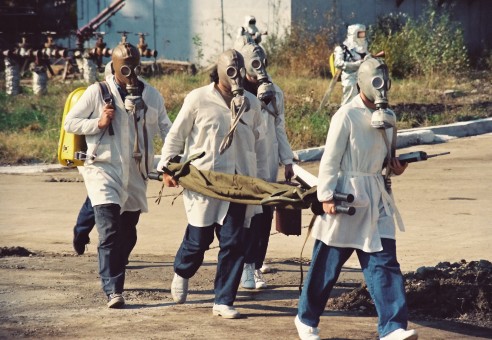Evil is wrought by human rebellion
Two American relief workers, observing a controversial Cambodian delicacy ritual of sucking out the brains of live monkeys, condemned the act as barbaric. But their Cambodian host and translator pushed back: “What right do you have to condemn this practice when people in America suck live babies from their mothers’ wombs?”
The West’s conception of human rights comes from the biblical understanding that we are made in God’s image and that God, not man, is sovereign. Yet while humans are the crowning glory of God’s creation and of inestimable worth, the Bible and millennia of history teach us that we are sinners; every part of our human nature is affected by sin. Theologians call this condition “total depravity.” In Issues Facing Christians Today, John Stott wrote that total depravity “has never meant that every human being is as depraved as he could possibly be, but rather that every part of our humanness, including our mind, has become distorted by the Fall.”
The Biblical View of Man
 Man is a wonder, the crown of God’s creation, made in the image and likeness of God and told to fill the earth and rule over it. When we play our part in God’s unfolding story as the envoys who implement it, as he intended, amazing things happen. When we turn against God, profound evil results.
Man is a wonder, the crown of God’s creation, made in the image and likeness of God and told to fill the earth and rule over it. When we play our part in God’s unfolding story as the envoys who implement it, as he intended, amazing things happen. When we turn against God, profound evil results.
In Nazi Germany, millions of Jewish, Gypsy, enfeebled, and sick people were imprisoned, tortured, and killed. At the same time, the hand of the eugenics movement was reaching deeply into the intellectual soil of the United States, a country founded on the notion that “all men are created equal.”
Planned Parenthood founder Margaret Sanger said in her 1922 book Pivot of Civilization, “Feeble-mindedness perpetuates itself from the ranks of those who are blandly indifferent to their racial responsibilities. And it is largely this type of humanity … which we must, if civilization is to survive, extirpate by the very roots.”[i]
Before that, the same kind of utilitarian considerations consigned millions to slavery throughout the British Empire and the United States.
Now a new term has been added to the world’s vocabulary: gendercide, the systematic extermination of a gender group, in this case the female. Authorities now estimate that some 200 million women are “missing.” Some were killed on their wedding night, others were victims of infanticide, murdered the day they were born. Others died before seeing the light of day through sex-selective abortion. In fact, every year more female babies are killed in China and India than are born in the United States.
Man Is a Rebel
The story of the fall of human beings is not only valid history but also the best explanation of our depravity. Adam and Eve were placed in a perfect environment. Created as free beings with a single prohibition: “you must not eat from the tree of the knowledge of good and evil, for when you eat from it you will certainly die.”
The humans rebelled and the consequences have reverberated down through history. At the moment of Adam and Eve’s disobedience, their primary relationship (with God) was broken, and they died spiritually. All their secondary relationships, as shown by their shame and blame, were fractured as well.
Because people remain significant, our sinful decisions affect the world around us. What is in our hearts eventually manifests itself externally (see Rom. 1:24–27), dragging us deeper into sin and depravity. These two words—sin and depravity—are curiously absent from the modern vocabulary. But we have seen evidence of their reality from the dawn of history.
Many people want to change the world. But few recognize that we must first change the human heart and mind. The system is broken.  Natural evil (death, hunger, drought, suffering, pain in childbirth, weeds in the garden) abounds. In addition, the moral evil of others, and of ourselves, wafts across the landscape like mustard gas. These are consequences of the fall.
Natural evil (death, hunger, drought, suffering, pain in childbirth, weeds in the garden) abounds. In addition, the moral evil of others, and of ourselves, wafts across the landscape like mustard gas. These are consequences of the fall.
Moral, natural and institutional evil
Further, we usually experience consequences that fit our behavior. A lazy person often ends up impoverished (unless someone else cares for him or her). Engaging in immoral behavior, such as fornication, adultery, or homosexuality, can bring disease and death. Addictions of all kinds ruin careers and shatter families. While these consequences are played out daily, they are not to be considered normal, certainly not from God’s perspective. Moral, natural, and institutional evil are intruders in the world. As members of a worldwide resistance movement we must fight sin in all its forms and all its effects. Medicine stands as a rebel against disease, agriculture against blight, education against ignorance, law against anarchy.
Ultimately, God undoes the consequences of the fall through his plan of redemption of and reconciliation with sinners. The Great Commission is nothing less than a call to disciple nations. But if the church does not disciple the nations, the nations will disciple the church. The human predicament is systemic. It is not merely spiritual brokenness, nor is it merely a structural problem. Every particle of our existence is affected. All our relationships are shattered too, including the primary, vertical bond with God.
Broken relationships produce devastating consequences. Our human vanity creates a world of illusion that we project onto the real world. Today’s fierce battle over human sexuality and the family is an example. In country after country the traditional, historic, and biblical definition of marriage (one man and one woman for life) is being replaced by ancient pagan concepts of sexuality. We are “redefining” marriage to include homosexual and polyamorous relationships.
What evil does in a society
How did this happen? The Bible teaches that people without Christ are spiritually enslaved by the demonic, counterfeit kingdom. Paul writes, “For our struggle is not against flesh and blood, but against the rulers, against the authorities, against the powers of this dark world and against the spiritual forces of evil in the heavenly realms” (Eph. 6:12).
 When societies build their institutions on the comforting but misguided ideal that people are basically good, millions die needlessly when reality fails to match the ideal. Maintaining order in such societies eventually requires totalitarianism. But when societies build their institutions on the reality of man’s sin, they will more likely create institutions that restrain evil, lawlessness, and death. Free-market economic and republican political structures, for all their limitations and warts, are significantly better than the alternatives in restraining evil and ensuring ordered liberty. This is so because they acknowledge our depravity.
When societies build their institutions on the comforting but misguided ideal that people are basically good, millions die needlessly when reality fails to match the ideal. Maintaining order in such societies eventually requires totalitarianism. But when societies build their institutions on the reality of man’s sin, they will more likely create institutions that restrain evil, lawlessness, and death. Free-market economic and republican political structures, for all their limitations and warts, are significantly better than the alternatives in restraining evil and ensuring ordered liberty. This is so because they acknowledge our depravity.
Once I had the pleasure of rooming with a Costa Rican political activist. One night after dinner this man told me he was thinking of running for president and asked for my advice. “Make sure there are laws to protect the people from you,” I said, hoping to provoke a thoughtful discussion.
“What do you mean?” he retorted, a little bemused.
“Make sure the laws of Costa Rica will protect the citizens of Costa Rica from you and your excesses.”
“Why?” he sputtered.
“Because power corrupts,” I said, stealing a page from Lord Acton. “If you don’t take into account that you are sinful, the power of the presidency will corrupt you.”
Whether he ever took my advice, I don’t know.
- Darrow Miller
This DM&F Classic blog post is excerpted from the book Discipling Nations. For the entire text go here.
[i] Angela Franks, Margaret Sanger’s Eugenic Legacy: The Control of Female Fertility (Jefferson, NC: MacFarland, 2005), 15.






